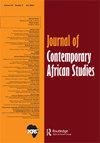加纳国内军事行动剖析:探索先锋队行动与平静生活
IF 0.8
Q2 AREA STUDIES
引用次数: 4
摘要
本文关注的是军事参与国际维和行动对加纳国内安全的影响。虽然对维持和平人员在减少东道国冲突方面的作用有相当的认识和了解,但很少注意到他们回国后的行动。维持和平产生的资金、训练和战斗经验可能在其本国产生相当大的体制、政策、行动(战术、技术和程序)和政治后果。特别是在加纳,维和训练和作战经验为国内安全干预提供了工具。加纳的政策逐渐发生了变化,军队参与了几项地方安全行动。这一政策转变导致了一些涉及军队和警察的联合内部行动的建立。基于在加纳的实地调查,本文探讨了两个主要的内部行动:“平静生活行动”(打击武装抢劫)和“先锋行动”(打击非法采矿)。该研究表明,维持和平经验的不同层面如何对形成国内安全保障产生实际影响。本文章由计算机程序翻译,如有差异,请以英文原文为准。
The Anatomy of Ghanaian Domestic Military Operations: Exploring Operations Vanguard and Calm Life
This article focuses on the under-researched and under-discussed domestic security implications in Ghana of military participation in international peacekeeping operations. While there is appreciable awareness and knowledge of the role of peacekeepers in reducing conflict in host countries, very little attention is given to their actions when they return home. The money, training and combat experience emanating from peacekeeping are likely to have considerable institutional, policy, operational (tactics, techniques and procedures) and political consequences in their home countries. In Ghana, especially, peacekeeping training and combat experience provide tools that can be used for internal security interventions. Increasingly, there has been a change in policy in Ghana where the military is involved in several local security operations. This policy shift has seen the creation of a number of joint internal operations involving the military and the police. Based on fieldwork in Ghana, the article explores two major internal operations: Operation Calm Life (to combat armed robbery) and Operation Vanguard (to combat illegal mining). The study shows how diverse dimensions of experience from peacekeeping have practical implications for shaping domestic security provision.
求助全文
通过发布文献求助,成功后即可免费获取论文全文。
去求助
来源期刊

Journal of Contemporary African Studies
AREA STUDIES-
CiteScore
2.20
自引率
0.00%
发文量
18
期刊介绍:
Journal of Contemporary African Studies (JCAS) is an interdisciplinary journal seeking to promote an African-centred scholarly understanding of societies on the continent and their location within the global political economy. Its scope extends across a wide range of social science and humanities disciplines with topics covered including, but not limited to, culture, development, education, environmental questions, gender, government, labour, land, leadership, political economy politics, social movements, sociology of knowledge and welfare. JCAS welcomes contributions reviewing general trends in the academic literature with a specific focus on debates and developments in Africa as part of a broader aim of contributing towards the development of viable communities of African scholarship. The journal publishes original research articles, book reviews, notes from the field, debates, research reports and occasional review essays. It also publishes special issues and welcomes proposals for new topics. JCAS is published four times a year, in January, April, July and October.
 求助内容:
求助内容: 应助结果提醒方式:
应助结果提醒方式:


